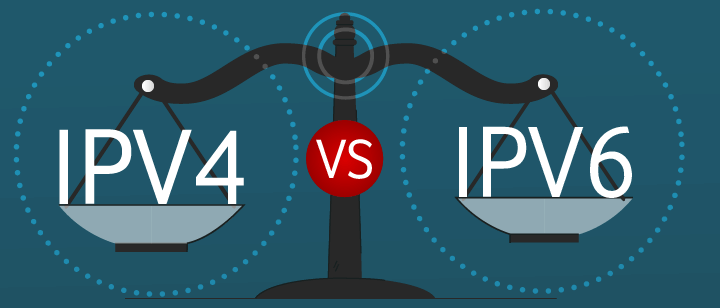The Internet uses IP (Internet Protocol) addresses to identify devices and allow system communications. Due to the growing global connectivity, the constraints of IPv4 resulted in the development of IPv6, which was a more scalable Internet protocol. The knowledge of the IPv4 and IPv6 distinction supports companies, information technology experts, and technology enthusiasts in selecting the most suitable one to perform efficiently, securely, and without failures. This guide will examine some of the main difference in Ipv4 and Ipv6, pros and cons and which protocol can be most optimal in your particular requirements in the digital world today.
Understanding the Key Difference in IPv4 and IPv6
Address Structure and Length
The IPv4 address is available in a 32-bit numeric address, which is typically formed through four decimal numbers with dots, e.g., 192.168.1.1. By comparison, IPv6 uses a 128-bit alphanumeric address, such as 2001: 0db8: 7334. IPv6 has an enormous address capacity, eliminating the necessity of NAT to allow peer-to-peer and global communication between devices.
Header Complexity
IPv4 headers are more complex and need more processing by routers, which may reduce the speed of data routing. IPv6 proposes a simpler format of the header, which makes the processing of packets faster and routing more effective. This simplified methodology increases the effectiveness of the network, particularly within fast systems and Internet of Things (IoT) systems.
Configuration and Management
When you are buying IPv4 block, understand that its setup usually requires some form of manual configuration or DHCP, which is time-consuming in extensive networks. IPv6 eases this using automatic or stateless address configuration, where devices can configure themselves. This saves on administration work, enhances scalability and provides a smoother administration of growing corporate and enterprise networks.
Security Features
IPv4 does not have built-in security, which would offer the use of external security options like firewalls or VPNs as a security measure. IPv6 has built IPsec into its system and provides authentication, encryption and verification of the integrity of the data. This inbuilt protection makes IPv6 more robust and reliable in terms of sensitive information and contemporary cybersecurity requirements.
Address Availability
As you plan to buy static IPv4 address, know that it offers approximately 4.3 billion unique addresses, and this cannot sustain the increasing number of internet devices across the world. This will guarantee that there is ongoing connectivity, smooth IoT, and sustainable growth in the emerging technologies, smart cities, and AI-powered networks.
Compatibility and Transition
Most systems and network hardware are still able to support IPv4. But IPv6 needs new routers, operating systems, and a dual-stack setup to run in conjunction with IPv4. Companies can move step by step, keeping both protocols as they progress through the migration phase, to service and be compatible with all the global networks.
Advantages and Disadvantages of IPv4 and IPv6
IPv4 Advantages
You can rent IPv4 address as it is very compatible with both networks and devices. It is an easy-to-set-up and managed infrastructure and is therefore best applicable in small systems and conventional infrastructure. The reliability of the protocol is long-lasting to provide quality communication and unchangeable connectivity among the world networks.
IPv4 Disadvantages
IPv4 is experiencing significant problems with the scarcity of addresses that are provided by its 32-bit format. It offers inefficient data routing and does not offer built-in security. Due to the increasing internet demands, IPv4 is no longer able to handle the current applications and complex workarounds.
IPv6 Advantages
IPv6 provides virtually infinite address space, which allows expansion and innovation in the future. It offers built-in security, quicker routing and a manageable network. IPv6 is excellent to support IoT, 5G, and cloud technologies. It brings upon smoother, scalable and more secure communication between linked systems worldwide.
IPv6 Disadvantages
The use of IPv6 may be complicated because of limited support for older hardware and software. Modernization of networks may necessitate new settings and skilled staff. The change to IPv4 requires investment, time and planning. Thus, full implementation is a slower process in most current network environments.
Which One Is Better and Why?
In the comparison of IPv4 vs. IPv6, it is more evident that IPv6 is the future because of its scalability, security, and the performance it offers. Nevertheless, IPv4 is still necessary due to its worldwide coverage as well as its ease of use. A hybrid dual-stack system, in which both protocols are supported, is the most suitable in most organizations. This guarantees backward compatibility and allows future readiness.
IPv6 is handy in the case of enterprises, ISPs, and industries based on IoT. It is essential to connect a vast number of devices and provide efficient routing. Finally, IPv6 is the long-term solution because it is faster, safer, and aimed to support the increased demands of digital transformation.
FAQs: Common Questions People Often Ask
1: Why is IPv6 better than IPv4?
IPv6 has higher speeds, built-in security, and an unlimited number of IP addresses, unlike IPv4, where the range is limited.
2: Are IPv4 and IPv6 compatible with each other?
Yes, dual-stack networks can run both IPv4 and IPv6 in parallel, and this guarantees an easy transition and compatibility.
3: Is IPv6 faster than IPv4?
Yes, IPv6 enhances the efficiency of routing, lowers the latency, and does away with NAT, making the connection speedier and more trustworthy.
4: Does IPv6 require new hardware?
All modern routers and equipment often work with IPv6; however, older equipment may need firmware updates or replacement.
Empower Your Network Future with IPV4 TradeHub!
Looking to buy, sell, or lease IPv4 addresses safely and efficiently? IPV4 TradeHub connects you with verified global sellers, secure transactions, and expert guidance for seamless IP transfers. Whether you’re scaling your business or optimizing network resources, we make IPv4 trading simple, transparent, and fast. Visit us today to unlock reliable IP solutions and stay ahead in the evolving digital landscape!
